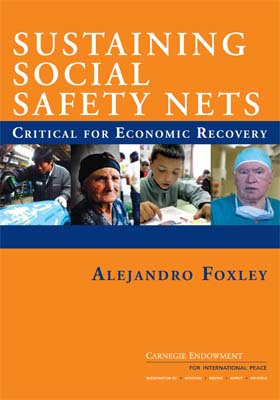The coverage and quality of basic social services—from unemployment insurance to health care and social security—will likely suffer as middle-income countries recover from the global financial crisis. Faced with high unemployment and growing government deficits, existing social services will become stressed. Yet maintaining these safety nets is a vital part of recovery without which significant segments of the middle class may slip into poverty, concludes a paper by Alejandro Foxley, former foreign and finance minister of Chile.
Foxley analyzes the provision of social services in Eastern Europe, East Asia, and Latin America and makes recommendations for how safety nets need to be restructured to protect vulnerable groups.
Lessons for policy makers
- Don’t copy other models: It is more efficient to strengthen social services within the country’s existing institutional framework. If the system is largely public, governments need to tackle the problems of inadequate funding and low-quality services. If the system is mainly private, the challenge is to reduce costs through more competition.
- Macroeconomics matter: Good economic policies allow countries to continue providing social services even during downturns. Significant deficits in Eastern Europe have forced governments to reduce social spending, while current account and budget surpluses in Latin America have allowed countries to maintain social support.
- Equality supports strong democracies: More equality will strengthen democracies, but reducing economic insecurity by expanding social safety nets is not sufficient. Countries need to enhance the skills of their workforces to lessen income gaps that widen during economic booms.
“The aftermath of the current global financial crisis will make it obvious that an active role for the state is unavoidable to cover the most vulnerable groups of the population and to mend existing social safety nets in terms of cost and accessibility,” writes Foxley.
